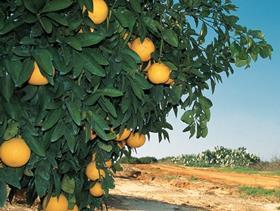
The Israeli citrus industry is in a positive frame of mind heading into 2013, according to Tal Amit, general secretary of the citrus division at the country's Plant Production and Marketing Board.
Speaking exclusively to Eurofruit, Amit said that producers and exporters were optimistic despite the shadow of recent freight rate increases hanging over them.
Production is on the increase with a total planted area of 19,100ha, with over 1,000ha of new plantings put down in each of the last four years.
Amit divides the citrus crop into four distinct areas – oranges (4,000ha planted), grapefruit (4,000ha), easy peelers (8,000ha) and other including lemons and pomelos (3,000ha).
According to Amit, while there are 2,500 listed citrus growers in the country, the number of active growers is closer to the 1,000 mark.
Total annual citrus production in the country stands at around 600,000 tonnes, with 27 per cent consumed domestically, 33 per cent exported and 40 per cent sent for local processing.
Easy peelers have been the stars of the category in recent years, Amit explained, led by the Orri variety, of which 75,000 tonnes is produced per year – although this is expected to double by 2014 with some 80 per cent, or a potential 130,000 tonnes, to be made available for export. Meanwhile, a promising new variety called Odem is now at the introductory stage.
By contrast, the position of the country's orange export market has weakened due to increased competition from Spain, Morocco and, more recently, Egypt.
Grapefruit is suffering from a reduced demand, Amit noted, through both greater competition from Florida and Turkey and also because of questions raised regarding potential health issues 're a conflict of materials within grapefruit and also some fairly common medicines'. Despite this, the current grapefruit campaign has started well with good yields and prices.
Citrus shipments from Israel are divided between western Europe (45 per cent), Russia (25 per cent) and the UK (20 per cent), with 'necessary steps' – such as on-site phytosanitary inspections – being carried out to encourage exports to China, Japan and South Korea.



